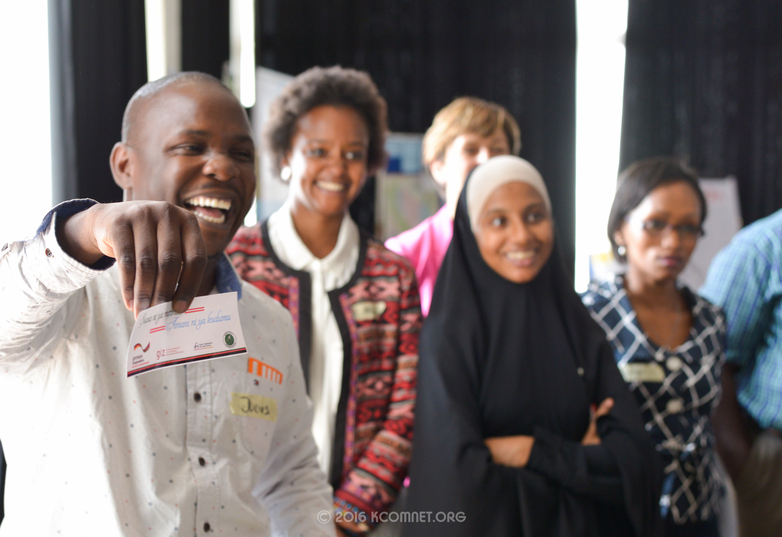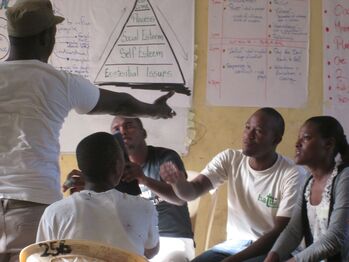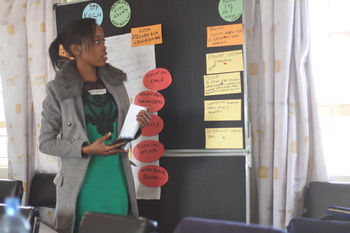Civil Peace Service: Using civil methods to manage violent conflicts
Project description
Title: Civil Peace Service: Transformation of violent conflicts in the context of social inequality through methods of civil conflict management
Commissioned by: German Federal Ministry for Economic Cooperation and Development (BMZ)
Country: Kenya
Overall term: 2009 to 2022

Context
Despite Kenya's strong economic growth, the majority of the country's population lives in poverty. Kenya has been deeply divided since colonial times. This extreme inequality has various causes, including an inequitable distribution of the country’s scarce resources, corruption and unequal access to state services. Rapid population growth, high youth unemployment, impunity and unfavourable environmental conditions also fuel conflicts.
Most of the conflicts run along ethnic lines and are exacerbated by vested political interests. Crime and insecurity are rife across much of the country. Attacks by the Al-Shabaab terror group additionally destabilise the country. Elections often result in escalations of violence. In one of the worst outbreaks of violence, some 1,200 people were killed and 600,000 were displaced in the 2007-2008 post-election unrest. The reform agenda launched in the wake of this and a new constitution have not achieved the desired effects.
Since President Uhuru Kenyatta won the 2013 elections together with William Ruto, there has been increased repression of opposition groups, the media, civil society organisations and human rights defenders. The unrest accompanying the 2017 elections went on for weeks, although far less blood was shed than ten years previously. Nevertheless, the situation only calmed down when President Kenyatta and his opponent Raila Odinga agreed on a single convention in March 2018. This step has potential for restoring peace – with a view to the next elections – but also for conflicts to escalate.
Objective
Strongly established partner organisations are increasingly taking measures in a conflict-sensitive and target group-oriented manner. Local stakeholders are handling conflicts that relate to social inequality without the use of violence, thus promoting social cohesion at community level.

Approach
The Civil Peace Service (CPS) has been supporting civil society partner organisations in Kenya since 2009 – and in recent years increasingly also governmental partner organisations. At present, the focus is on peace journalism, alternative dispute settlement and on establishing dialogue structures that encourage people to resolve conflicts without violence. Specifically, this means promoting the acceptance of diversity among the general public while managing past and acute conflicts through mediation. A further aim is to bring about a positive change in the attitudes of the general public, governmental representatives and politicians and promote socio-economic justice.
On top of this, the CPS is campaigning for the media to report neutrally and include more peacebuilding topics in their programmes. Psychosocial support is being provided for those traumatised by violence, injustice, poverty and a lack of prospects, as well as for employees of partner organisations, to strengthen them and encourage them to take part in dialogue processes.

Results
With the aid of the project, for example, much more effective internal organisational structures have been established at the Media Council of Kenya. By providing targeted training measures tailored to the requirements of employees at partner organisations, the project has improved the implementation of peace projects.
The Kenya National Commission on Human Rights is strengthening the network of human rights organisations along the Kenyan coast. The partners Kituo Cha Sheria and FIDA Kenya are helping to allow less-heeded groups in three regions to use mediation to resolve conflicts such as those relating to returning land. Families and neighbours who have been enemies for ten years are beginning to speak to one another again.
The Radio-for-Peace programme run by the partner organisation Kenya Community Media Network supports 40 local radio stations. A radio play on the topic of displacement that is broadcast across all stations thus reaches millions of listeners. The organisations Haki Yetu and Pamoja for Transformation work with nearly 1,000 young people, aiming to provide them with new prospects and a chance for reintegration into the community. In addition, employees of our partners are being trained to recognise traumatised people and provide them with appropriate care.